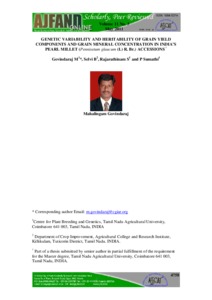Genetic variability and heritability of grain yield components and grain mineral concentration in India's pearl millet (Pennisetum glaucum (L) R. Br.) accessions
Abstract
Pearl millet (Pennisetum glaucum (L.) R. Br.) is an important cereal in semi-arid tropics in Africa and India. Conventionally, millet has good amounts of grain minerals compared to other cereals. Estimation of genetic parameters would be useful in developing appropriate breeding and selection strategies. The present study was conducted to evaluate the local pearl millet accessions to assess the magnitude of variability and to understand the heritable component of variation present in the yield and nutritional characters. A field trial was laid under the complete randomized block design (RCBD) with three replications; observation were recorded on eight morphological and seven nutritional characters (as detailed in material and methods) including anti-nutritional properties such as phytate content among 61 genotypes collected from millet collection. The phenotypic co-efficient of variation (PCV) was greater than genotypic co-efficient of variation (GCV) for all the characters studied; this shows the influence of environmental factors on the characters. The phosphorus content had expressed the highest phenotypic and genotypic variances (845.30 and 772.08, respectively). The magnitudes of phenotypic and genotypic variances were low for the 100 grain weight (0.001 for both phenotypic and genotypic variance). High estimates of genetic co-efficient of variation, heritability and genetic advance were exhibited by iron and crude fat content. Heritability is a measure of possible genetic advancement under selection. High heritability was observed for all the traits under study except seed weight which had moderate heritability. High value of heritability coupled with high genetic advance as per cent of mean were recorded for number of productive tillers, crude protein, crude fat, phytate, phosphorus, calcium, iron and zinc content, indicating the important role of additive gene action for the expression of these characters. Therefore, selection based on these characters could bring about desired improvement in yield as well as nutritional quality of pearl millet cultivars

